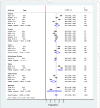Prevalence of Poor Diabetes Self-Management Behaviors among Ethiopian Diabetes Mellitus Patients: A Systematic Review and Meta-Analysis
- PMID: 33897223
- PMCID: PMC8054449
- DOI: 10.4314/ejhs.v30i4.18
Prevalence of Poor Diabetes Self-Management Behaviors among Ethiopian Diabetes Mellitus Patients: A Systematic Review and Meta-Analysis
Abstract
Background: Diabetes has no cure so far, but appropriate self-management contributes to delay or control its progression. However, poor self-management by diabetic patients adds to disease burden. The pooled prevalence of overall, and its main components of poor self-management among Ethiopian diabetic patients remain elusive. Hence, this study aimed to determine the prevalence of poor diabetes self-management behaviors among diabetic patients in Ethiopia.
Method: by using different combinations of search terms, we accessed articles done until February 15, 2020 through Pubmed, Scopus, Web of Science and Embase databases. Newcastle-Ottawa quality assessment scale was used for quality assessment, and STATA version 14 software along with the random-effects model was employed for statistical analyses. The Preferred Reporting Items for Systematic Reviews and Meta-Analyses (PRISMA.) guideline was followed to report the results.
Result: Twenty-one studies with 7,168 participants were included in this meta-analysis. The overall pooled prevalence of poor self-management behavior among diabetic patients in Ethiopia was 49.79% (95% CI: 43.58%, 56.01%). Based on subgroup analysis, the estimated magnitudes of poor self-management by regions were 68.58% in Tigray, 55.46% in Harari, 54.74%, in Amhara, 40.90%, in SNNPRS and 37.06% in Addis Ababa. The worst (80.91%) and relatively better (24.65%) self-management components were observed on self-blood glucose monitoring and medication adherence, respectively.
Conclusion: One in two diabetic patients in Ethiopia had poor self-management. Thus, we strongly recommend to the ministry of health and universities to train diabetes health educators, and the health facilities to deliver tailored diabetes health education.
Keywords: Diabetes mellitus; Ethiopia; Meta-analysis; Prevalence; Systematic review; poor self-management.
Copyright: © 2020 Teshome Tesfaye Habebo, et al.
Figures





Similar articles
-
Level of self-care practice among diabetic patients in Ethiopia: a systematic review and meta-analysis.BMC Public Health. 2020 Mar 12;20(1):309. doi: 10.1186/s12889-020-8425-2. BMC Public Health. 2020. PMID: 32164638 Free PMC article.
-
Diabetic Peripheral Neuropathy in Ethiopia: A Systematic Review and Meta-Analysis.J Diabetes Res. 2021 Feb 4;2021:5304124. doi: 10.1155/2021/5304124. eCollection 2021. J Diabetes Res. 2021. PMID: 33628833 Free PMC article.
-
The Prevalence of Depression among Diabetic Patients in Ethiopia: A Systematic Review and Meta-Analysis, 2018.Depress Res Treat. 2018 May 23;2018:6135460. doi: 10.1155/2018/6135460. eCollection 2018. Depress Res Treat. 2018. PMID: 29951313 Free PMC article. Review.
-
Prevalence and determinants of poor sleep quality among diabetic patients in Ethiopia: systematic review.Front Public Health. 2024 May 14;12:1363408. doi: 10.3389/fpubh.2024.1363408. eCollection 2024. Front Public Health. 2024. PMID: 38807992 Free PMC article.
-
Determinants of diabetic retinopathy in Ethiopia: A systematic review and meta-analysis.PLoS One. 2023 Jun 8;18(6):e0286627. doi: 10.1371/journal.pone.0286627. eCollection 2023. PLoS One. 2023. PMID: 37289766 Free PMC article.
Cited by
-
Time to Diabetic Nephropathy and its Predictors Among Diabetic Patients Treated in Wolaita and Dawuro Zone Hospitals, Ethiopia: A Retrospective Cohort Study.Int J Nephrol Renovasc Dis. 2023 Jun 12;16:163-172. doi: 10.2147/IJNRD.S396574. eCollection 2023. Int J Nephrol Renovasc Dis. 2023. PMID: 37332621 Free PMC article.
-
Effect of physical activity promotion program on adherence to physical exercise among patients with type II diabetes in North Shoa Zone Amhara region: a quasi-experimental study.BMC Public Health. 2023 Apr 19;23(1):709. doi: 10.1186/s12889-023-15642-7. BMC Public Health. 2023. PMID: 37072775 Free PMC article.
-
The Role of Community Organisation, Religion, Spirituality and Cultural Beliefs on Diabetes Social Support and Self-Management in Sub-Saharan Africa: Integrative Literature Review.J Relig Health. 2025 Aug;64(4):2407-2464. doi: 10.1007/s10943-024-02233-y. Epub 2025 Jan 24. J Relig Health. 2025. PMID: 39853664 Free PMC article. Review.
-
Changes in pre-diabetes and diabetes prevalence and diabetes self-management behaviors across socioeconomic spectra in rural southwest China: 2013-2022.BMC Public Health. 2025 Feb 13;25(1):594. doi: 10.1186/s12889-025-21763-y. BMC Public Health. 2025. PMID: 39948504 Free PMC article.
-
Association of stress management behavior and diabetic self-care practice among diabetes type II patients in North Shoa Zone: a cross-sectional study.BMC Health Serv Res. 2023 Jul 19;23(1):767. doi: 10.1186/s12913-023-09752-6. BMC Health Serv Res. 2023. PMID: 37468888 Free PMC article.
References
-
- Gebre-Yohannes A, Rahlenbeck SI. Glycaemic control and its determinants in diabetic patients in Ethiopia. Diabetes research and clinical practice. 1997;35(2-3):129–34. - PubMed
-
- Alwan A. Global status report on noncommunicable diseases 2010: World Health Organization. 2011.
-
- Ducey CMC Douglas A., Contreras Omar A., Sandoval-Rosario Michelle. 2018. Diabetes in Arizona: The 2018 Burden Report. Arizona department of health services bureau of Tobacco and Chronic disease division of public health prevention services; pp. 1–46.
Publication types
MeSH terms
Substances
LinkOut - more resources
Full Text Sources
Medical
